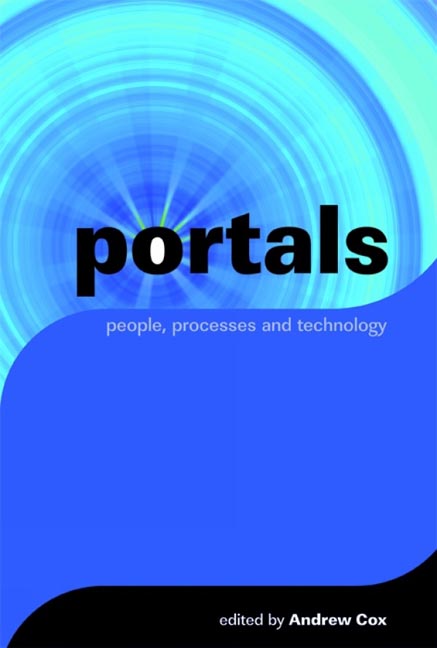Book contents
- Frontmatter
- Contents
- Introductory preface
- Section 1 Core themes
- Section 2 The library and the portal
- 7 Ready to use: consumer, subject and other public portals
- 8 Portals and university libraries
- 9 Library portals
- Section 3 The portal in the corporate sector
- Section 4 Portals in the public sector
- Section 5 The future
- The contributors
- Index
8 - Portals and university libraries
from Section 2 - The library and the portal
Published online by Cambridge University Press: 09 June 2018
- Frontmatter
- Contents
- Introductory preface
- Section 1 Core themes
- Section 2 The library and the portal
- 7 Ready to use: consumer, subject and other public portals
- 8 Portals and university libraries
- 9 Library portals
- Section 3 The portal in the corporate sector
- Section 4 Portals in the public sector
- Section 5 The future
- The contributors
- Index
Summary
The promise of libraries
Libraries are places of contradiction. The library many of us still think of when we use the word – the building or place filled with mostly printed material – invites its users to find or ask for an item of recorded knowledge by which they may be informed for their improvement or their harmless entertainment. The invitation has behind it a thrilling and inspiring assumption: that the work of humankind should be freely available for all to share, and that the places for sharing it should be found within every town or city, and essentially within every place of learning. Nevertheless, this free use of our collective intellectual resource is not really free at all. As contributors to our societies, we pay for the service through taxation and, in doing so, we pay for a service based on a distribution ratio of one resource to many users. The use of the resource is therefore constrained by demand, and time-limited. If we breach that condition, we pay a fine, or a replacement item charge. And if we want an item which is not held by our local library, we may well have to pay a charge for the administrative effort of using our library as a user of some larger library somewhere else. The assumption behind the existence of libraries is thrilling and inspiring indeed, but the reality of service is inevitably compromised so that the freedom which they deliver is of course only a limited freedom.
Nonetheless, people love libraries because they are witness to something generous in our collective spirit: like free health care and free basic education, they acknowledge our duty to each other. What sets them apart from health care and education, and other social services, indeed, is that their usage is optional. Alongside museums and galleries, they belong to the category of use we call ‘culture’. They exist in their purest form as public libraries. The libraries we are concerned about here, academic libraries, are less pure because their use is mandated for the students, researchers and staff they serve for which they provide a collective resource pool.
- Type
- Chapter
- Information
- Portalspeople, processes and technology, pp. 100 - 114Publisher: FacetPrint publication year: 2006



